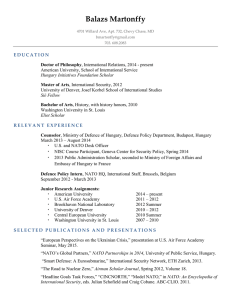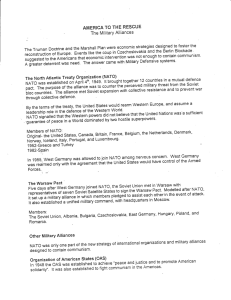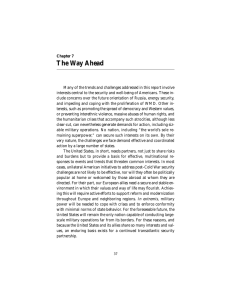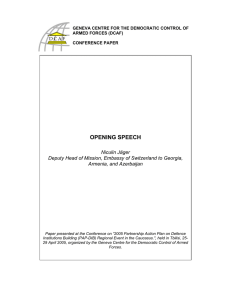PROMOTING STABILITY AND SECURITY IN THE CAUCASUS AND MOLDOVA: SUPPORTING
advertisement
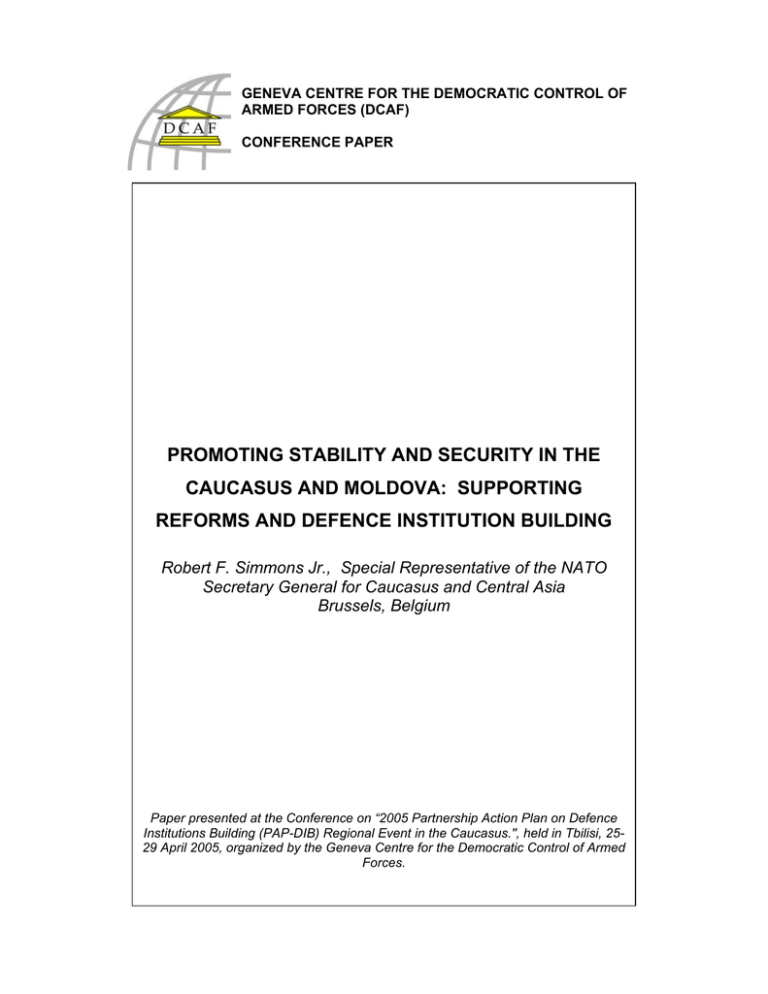
GENEVA CENTRE FOR THE DEMOCRATIC CONTROL OF ARMED FORCES (DCAF) CONFERENCE PAPER PROMOTING STABILITY AND SECURITY IN THE CAUCASUS AND MOLDOVA: SUPPORTING REFORMS AND DEFENCE INSTITUTION BUILDING Robert F. Simmons Jr., Special Representative of the NATO Secretary General for Caucasus and Central Asia Brussels, Belgium Paper presented at the Conference on “2005 Partnership Action Plan on Defence Institutions Building (PAP-DIB) Regional Event in the Caucasus.", held in Tbilisi, 2529 April 2005, organized by the Geneva Centre for the Democratic Control of Armed Forces. DCAF Conference Papers DCAF Conference Papers constitute studies designed to promote reflection and discussion on civil-military relations and issues of democratic control over defence and security sector. The publication of these documents is unedited and unreviewed. The views and opinions expressed are those of the author(s) and do not necessarily reflect those of the Geneva Centre for the Democratic Control of Armed Forces. DCAF Conference Papers are not for quotation without permission from the author(s) and the Geneva Centre for the Democratic Control of Armed Forces. PROMOTING STABILITY AND SECURITY IN THE CAUCASUS AND MOLDOVA: SUPPORTING REFORMS AND DEFENCE INSTITUTION BUILDING Robert F. Simmons Jr. Let me begin by thanking you both for your willingness to host this important Conference and to do so in this important meeting site: the Parliament of Georgia. Secondly, I would like to thank the Swiss authorities and the Centre for Democratic Control of Armed Forces who together with NATO Studies Centre in Romania have arranged and organised this Conference and the training course that will follow it to implement and introduce the concept of the Partnership Action Plan on Defence Institution Building (PAP-DIB). To the Conference I would like to welcome the participants of our host Nation Georgia, of Armenia and Moldova and those who come from Azerbaijan. I would have hoped finally that the Government of that country would have permitted official participation to this important Conference. One of the key and most vital aspects of NATO transformation has been its partnerships. Along with other aspects, NATO’s partnerships have evolved. They were and remain a critical path to membership. They have helped NATO’s own capabilities and enhancing the interoperability of Partners with Allied forces in crisis response operations. Finally, they have been for all Partners a way to enhance and measure their own reform efforts. For Partners from Western Europe, they have helped to find ways to develop their already existing peacekeeping capabilities. And as this Conference shows, for NATO’s new Allies they offer opportunities to share their experiences with other Partners. But since Istanbul, these have been in particular focused on the countries of the Caucasus and Central Asia, and my appointment as the Special Representative shows the willingness of the Alliance to implement that new focus. Some say that these regions have been neglected. Certainly, all of the Partnership programs have been open to all of them and I would hope they have also benefited from them. From what I have seen they have certainly benefited from training opportunities whilst so many officers from the countries of these regions have attended. They have also benefited from the Science Program and other Programs like the Virtual Silk Highway. But as our host country manifested more than any other its will to change NATO has adapted the Partnership to meet these new needs which stemmed from the expression of popular will. These Partners now can benefit fully from the great Spring of Nations which followed the end of the Cold War. Their citizens and their Governments have decided to draw closer to the Euro-Atlantic institutions, with membership clearly in their minds. Others decided to improve their relationship with NATO and the EU. As these countries improve their relations with NATO, the Alliance should be prepared to help them to deal with their problems. IPAP in which all countries in the region joined is the measuring stick on how they are meeting the broad challenge of reform: • to make the political system more open • to make justice and order work together under a rule of law • to reform their defence institutions to overcome the situation from the past and to meet the requirements of the future. The countries of the region have for centuries been victims of great power manipulation and were devastated by both the Soviet Communism and by its collapse. The transformation pains - excruciating as they would be for any Nation have been made worse by conflicts, secession, and the presence of foreign troops. Your countries share a difficult past. But you are not alone, and you are not forgotten. True, the so called "West" has no simple and immediate answers to the problems that you face. But America and Europe do have vital interests in security, prosperity and stability in the Caucasus and around the Black Sea. NATO is here not for charity, not for compassion, not because we love Georgian singing or Moldovan wine. It is not on a whim that we want to get involved and stay involved. It is political realism that tells NATO Nations' interests are no longer separable from yours; their security depends on yours. However, the most successful leaders in history were those who knew how to mix sober realism with courage and vision. Does NATO have a vision to combine with our "gut feeling" that our interests are at stake here? Is there a strategy behind our policies? To answer this question, I need to make a short detour through history. Historically, Nations have employed three ways of securing stability. "Stability through domination" has been tried in many incarnations, but created only short-lived illusions of peace and order. "Stability through balance of power" - was not much more successful, and eventually could not stop the twin cataclysms of 1st and 2nd World Wars. And then, Western Europe and North America tried a third and quite idealistic concept: "stability through integration." NATO and the EU were born out of this vision. And the vision worked! It worked wonderfully! In a few decades, it eradicated the legacy of conflict and violence in Western Europe. 40 years later, conditions emerged for repeating this experiment throughout Europe. And it has worked again even in the "unmanageable" Balkans! Integration works. It can work for you too. NATO's policy of Partnership is about making sure that it does. This policy has always been about sharing with the East the great historic experience of the West. And this policy is now focused on you. But let me be clear - integration may, but does not have to mean membership in either NATO or the EU. There are different levels and dimensions of this process, and there is a place in it for all Nations. Take Switzerland: it is member of neither organisation but is an integral part of Europe and is helping you - including here and today - to join the family. Then take Russia if you will: with the NATO-Russia Council it is today more integrated with NATO; it is linked to Western countries and institutions by a multitude of political, economic and security arrangements. We do disagree on many matters, but we also co-operate closely - in a stable framework of institutional co-operation. The integration project is for all and it will proceed. Those who are truly interested in it will find in NATO a reliable friend and partner. Armenia, Azerbaijan, Georgia, and Moldova, have all expressed their European vocation and I believe all four have a European future. But we have to work on it, and we need to work hard. Integration is not done by decree. It does not just happen. Integration is not about a momentary coincidence of security interests, however vital. It is about common values, common objectives, common institutions, and common policies. A Partnership which is about integration is about much more than military interoperability. Yes, it is important for us to have a Partner platoon in a NATO-led operation. But it is much more important that the platoon return home to a modern, democratic defence system, which will make full and legitimate use of the skills and experience that the soldiers have acquired. We must be frank - further change in your countries is a necessary pre-condition for their further integration with Europe, whatever this integration is to mean. Even security co-operation is not immune to this imperative and NATO leaders agreed at Istanbul that it "is impossible absent basic doctrines and institutions of a fundamentally democratic nature." (Refocusing and Renewal). NATO does not set democratic standards, nor do we seek to impose these standards on our Partners. But we are prepared to help those Nations who wish to pursue these standards, and we will focus our attention and resources on those who truly want to do so. And we can help a lot! We have unquestioned and unrivalled experience and expertise in defence planning and in defence reform. This is where we can give you what no other organisation and no single country can give: the best available and free-of-charge advice on how to make your defence system an efficient modern organisation, put in service of a democratic society in pursuit of legitimate goals. Some would say - defence reform is of secondary importance, it can wait, there are more important things to do. Why do it now? Well, I could quote great scholars who have argued that getting your defence institutions right is as fundamental to democracy as freedom of speech and free elections. The founding fathers of my own country - the United States - devoted much thought to this issue. They found enough space in the US Constitution - as short as they made it - for provisions safeguarding democratic control of the armed forces. This was done for a reason, and this reason is as important today as it was 200 years ago. Therefore, while offering help in defence reform, NATO is not inviting you on a trip to the margins of democratic transformation. Quite the contrary - we want to help you to get to its core. And, despite a popular misperception, getting there is not terribly expensive either! Real defence reform is actually about spending your limited resources better, smarter, and more efficiently. Ask your Baltic friends. Better yet, ask the Macedonians and Albanians who despite budgetary constrains comparable to yours have made huge progress in a relatively short time. It is not money that makes defence reform tick. It is political will to face the challenge and it is the knowledge how to do it best. Political will - you have to generate. Knowledge - NATO and Partners like Switzerland have and are offering you. And this - finally - brings me to Partnership Action Plan on Defence Institution Building (PAP-DIB). For PAP-DIB is about knowledge. It is not a new burdensome paper mechanism. It is not an alternative to IPAP. It is first of all our common definition of what defence and security reform is and what it involves. It is the alphabet of our common language on defence that we need to develop. We worked on it together and we agreed on it together. It is time to make use of this effort. NATO will work individually with each interested country to implement PAP-DIB. We will tailor our programmes to each country's specific needs and circumstances. There is an obvious degree of mutual confidence which is necessary to carry on meaningful co-operation on difficult reforms. IPAP provides the necessary framework for such work and is not in competition with PAP-DIB. However - as I hope you remember our ultimate goal is integration, not "splendid isolation." There are issues that are specific to each Partner country and will be dealt with individually - this is IPAP. But there also are issues that are common to many countries and where all these countries can benefit from common reflection and common education - this is PAPDIB. And this is what the conference is about. This is what the training course starting tomorrow will be about. This is what modern Partnership is about. We need to develop a common defence culture as an indispensable condition for taking the great European project across the Black Sea. For that we need common conceptual grounds, we need interoperability of minds as well as interoperability of guns. This is the right way to our common objective: a Europe truly whole, truly free, and truly at peace. If we keep focused on this objective, we will be able to overcome any difficulties we might encounter along the way. Established in 2000 on the initiative of the Swiss government, the Geneva Centre for the Democratic Control of Armed Forces (DCAF), encourages and supports States and non-State governed institutions in their efforts to strengthen democratic and civilian control of armed and security forces, and promotes international cooperation within this field, initially targeting the Euro-Atlantic regions. The Centre collects information, undertakes research and engages in networking activities in order to identify problems, to establish lessons learned and to propose the best practices in the field of democratic control of armed forces and civil-military relations. The Centre provides its expertise and support to all interested parties, in particular governments, parliaments, military authorities, international organisations, non-governmental organisations, academic circles. Geneva Centre for the Democratic Control of Armed Forces (DCAF): rue de Chantepoulet 11, P.O.Box 1360, CH-1211 Geneva 1, Switzerland Tel: ++41 22 741 77 00; Fax: ++41 22 741 77 05 E-mail: info@dcaf.ch Website: http://www.dcaf.ch
